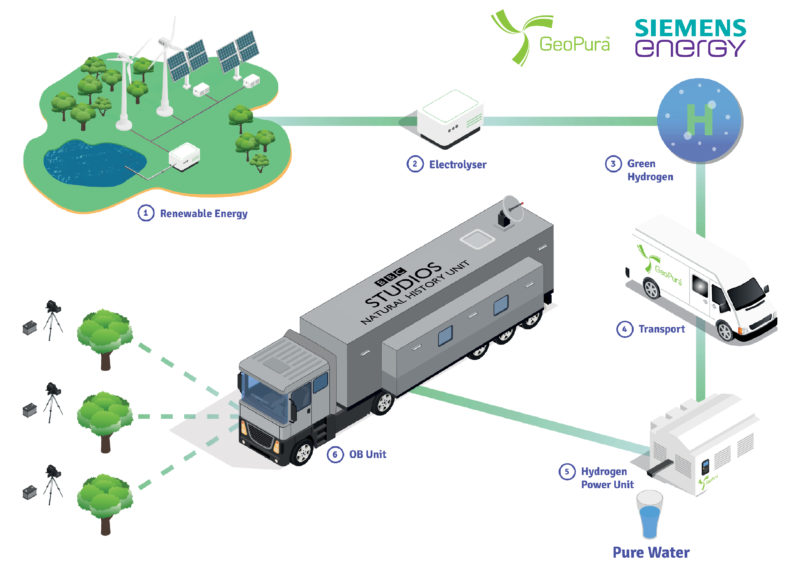— Andrew Cunningham, GeoPura Managing Director“The BBC Studios Natural History Unit and the Winterwatch production team, are to be congratulated for taking their environmental responsibilities seriously, even when it means working with unfamiliar technology in a high pressure environment. They have clearly demonstrated what’s possible when broadcasters and film makers are determined to ‘walk the talk’ when it comes to improving air quality and significantly reducing their contribution to climate change
”
Posted on 2nd February 2021
Winterwatch makes history
BBC's Natural History Unit made TV history with the world’s first large scale outside broadcast powered solely by green hydrogen
Did you catch last week’s Winterwatch? The live broadcast on the 26 January was powered entirely by green hydrogen fuel and energy saving batteries making it the world’s first large scale outside broadcast to transmitted in this way.
The hydrogen generator is located at Winterwatch’s outside broadcasting hub at BBC Bristol and is helping to replace the use of a diesel powered generator. Diesel generators are traditionally used in live outdoor productions, as filming often uses too much power to draw energy from the grid.
Across the show’s presenter locations, the production team used batteries powered by intelligent hybrid generator systems which use spare energy to charge batteries, significantly minimising the use of diesel fuel and CO2 emissions.
Using green hydrogen and the energy saving batteries instead of diesel twinset generators during one live episode of Winterwatch avoided 3.3 tonnes of carbon emissions. As calculated in our 2019-20 annual report, producing one hour of TV produces an average 9.2 tonnes of carbon emissions so this new method could have an extremely positive impact if widely adopted.
Provided by Siemens Energy and Geopura, the hydrogen generator uses hydrogen gas made by splitting water into hydrogen and oxygen using electricity generated by solar and wind power. When used the hydrogen turns back into pure and drinkable water, meaning that the ‘exhaust’ is emissions and waste free and the process is entirely circular (see diagram above).
The hydrogen generator will remain at BBC Bristol’s outside broadcasting hub for the duration of Winterwatch 2021, with plans already in place to bring back the use of green hydrogen for future series.
As part of the BBC’s efforts to be net zero by 2030, the Natural History Unit has committed to hiring local crews on location to reduce flying teams around the world, using drones instead of helicopters for aerial footage, and using methanol fuel cells to power remote cameras.
GeoPura is an albert approved supplier, see our full list of suppliers here

